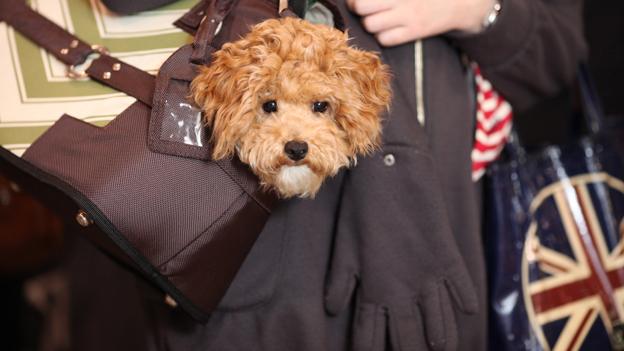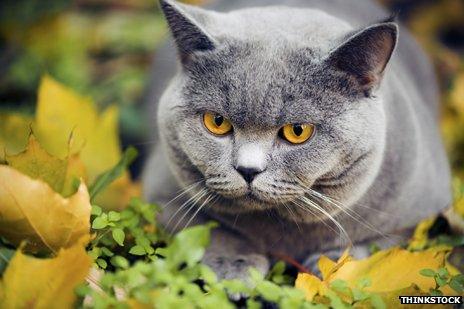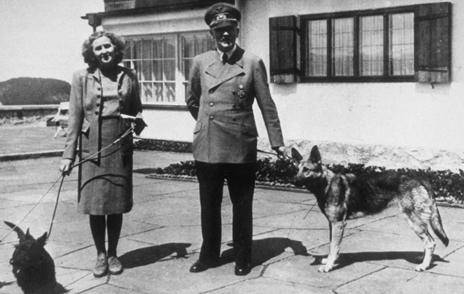A Point of View: Loving pets v loving animals
- Published

Is our love of pets always compatible with a love of wildlife? Writer and philosopher Roger Scruton puts the cat among the pigeons.
I live on a pasture farm, in a part of England where a thin topsoil covers a sub soil of clay. The only human use for this land is to support things that live on grass or its by-products. That means cows, sheep, pigs, chickens by way of domestic animals, game birds by way of wildlife, and horses for riding.
By far the most profitable of these animals, from the point of view of our local farming economy, are the horses, which bring people who earn real money into the countryside, and encourage them to turn that money into grass. Those who are trying to turn grass into money have a much harder time of it. Still, all in all, I see our little patch of farmland as an example of good-natured animal husbandry. All our domestic animals live in an environment to which they are adapted, enjoy basic freedoms, and are saved by our intervention from the lingering misery of old age and disease, or from a long drawn-out death from physical injury.
Wildlife, however, presents a moral problem. We go out of our way to ensure that the predators get through the hard days of winter, but do little or nothing for the mice and voles. Moreover we wage relentless war on the rats. There is a widespread habit in our neighbourhood of poisoning rats with warfarin, which then poisons the owls, buzzards and foxes that eat their remains. This habit has contributed to the near-terminal decline of the barn owl in our countryside, although I am glad to see that there is a petition afoot organised by the Barn Owl Trust to put a stop to it.
On the other hand, if we did not intervene in the natural order in this selective way, the scavengers would take over. When I read of "wildlife sanctuaries" I wonder how far their wardens are prepared to go, by way of managing those species which, if left to themselves, can turn a viable habitat into a desert - grey squirrels, for instance, roe deer, Canada geese, or cormorants.
And then - greatest problem of all - there are the pets. One neighbour has a dog which she walks along the public bridle way, leaving it free to run in the hedgerows and out into the fields. This dog does what dogs do - it sniffs for quarry and, when it finds something, gives chase. In the winter, when birds are hidden under leaves, conserving their energy as best they can, they cannot easily survive being chased every day.
The same is true of hares, rabbits and voles. Of course our neighbour is adamant that her dog would not dream of killing the things he chases - he is only doing what his nature requires. The same is true of the pheasant, the stoat or the rabbit that he is chasing. The difference is that the dog goes home to a warm house and a supper consisting largely of other animals which have been pressed into a tin, while its quarry goes hungry, trying to recover from the shock and weakened for its next encounter.
Another neighbour has a pair of cats - attractive animals, which know how to simulate affection towards their human owners, while policing all around them with the invincible insolence of a dominant species. Both dogs and cats are predators, but dogs can be trained not to kill. They can be trained to focus their hunting instincts on a particular species, or they can be bred to focus the very same instincts on some other and more humanly useful pursuit, such as herding sheep or retrieving game birds.

Domestic cats: Killer in our midst
Not so cats. Everything in their nature tends towards the single goal of killing, and although they can be pampered into relinquishing this goal, they are by that same process pampered into relinquishing their nature. A true cat wants out, and when out he or she wants death. The distinctions between fair and unfair game, between vermin and protected species, between friend and foe - all such distinctions have no significance for a cat, which sets off from the house in search of songbirds, field mice, shrews and other harmless and necessary creatures with no thought for anything save the taste of their blood.
One estimate puts at 180 million the number of wild birds and mammals lost to cats each year in Britain. The domestic cat is, without exception, the most devastating of all the alien species that have been brought onto our island. It is also protected, not only by law, but by the inquisitors sent round by the RSPCA, an organisation that claims to love wild animals, while devoting considerable resources to the creatures that destroy them.
Two questions should be asked of every love - does it benefit the one who receives it, and does it benefit the one who gives it? There are loves that enslave, stifle, exploit and abuse. Then again, there are loves which corrupt the people who enjoy them, giving them a false and flattering view of themselves, and a comforting picture of their own cost-free lovableness. I guess Hitler's love for his dogs was a bit like that. Love is not good in itself. It is good when part of virtue, bad when part of vice. Learning how and what to love is part of moral education, and love, like other emotions, must be disciplined if it is not to collapse into sentimentality on the one hand, or domination on the other. There are childish loves, dreamy loves, sugary loves, and we expect people to grow out of these things in time. Often, when they fail to do so, it is because a pet stands in the way.

Adolf Hitler and Eva Braun were devoted to their dogs
Love for animals is only exceptionally love for an individual animal. I love the wild animals on our farm but few of them are really individuals for me. It is the presence of bullfinches - not of any particular bullfinch - that delights me, and for which I work as best I can. Of course I am concerned when I come across a bird or a mammal in distress, and will try to help it, but this is not love, only ordinary kindness.
However, when it comes to dogs there is no doubt, not only that dogs reciprocate the affection of their owners, but also that they become attached to us as individuals, in a way that renders the owner irreplaceable in their affections - so much so that the grief of a dog may strike us as desolate beyond anything that we could really feel. The focused devotion of a dog, when it occurs (and not all dogs are capable of it), is one of the most moving of all the gifts that we receive from animals - all the more moving for not being truly a gift but rather a need. It seems to me that the recipient of such a love is under a duty to the creature that offers it, and that this creates a quite special ground for love that we must take into account. The owner of a loving dog has a duty of care beyond that of the owner of a horse, a sheep or a cow. To neglect or abandon such a dog is to betray a relation of trust.
Hence my neighbour is right to think that her obligation to her dog takes precedence over my duty to care for the wildlife whose welfare he threatens. It would be a moral deficiency in her to assume the right to enjoy her dog's unswerving affection while denying him what she can easily provide by way of a reward for it. Hence I don't judge her adversely for her irritating dog or her equally irritating love for it. The fault is mine, like the fault of being upset by the selfishness of families, as they strive to secure the best seats on a train. Each of us has a sphere of love, and we are bound to the others who inhabit it, whether they be people or animals.
Still we must recognise that by loving our pets as individuals we threaten the animals who cannot easily be loved in any such way. Loving our dogs and cats we put a strain upon the natural order that is felt most grievously by the birds and beasts of the field. And even if those creatures have no rights, this does not cancel the fact that we have duties towards them. Their duties become everyday more serious and demanding, as we humans expand to take over the habitats that we confiscate without scruple and enjoy without remorse. And our lack of scruple is only amplified by the love of pets, which inculcate in us the desire for easy-going, cost-free and self-congratulatory affections towards the animal kingdom, and which thereby threaten the rest of nature. The world of animals does not ask for the love of our favourites, which is easy, but for the love of the rest, which is hard.
A Point of View is broadcast on Friday on Radio 4 at 20:50 GMT and repeated on Sunday at 08:50 GMT. Catch up on BBC iPlayer
Follow @BBCNewsMagazine, external on Twitter and on Facebook, external